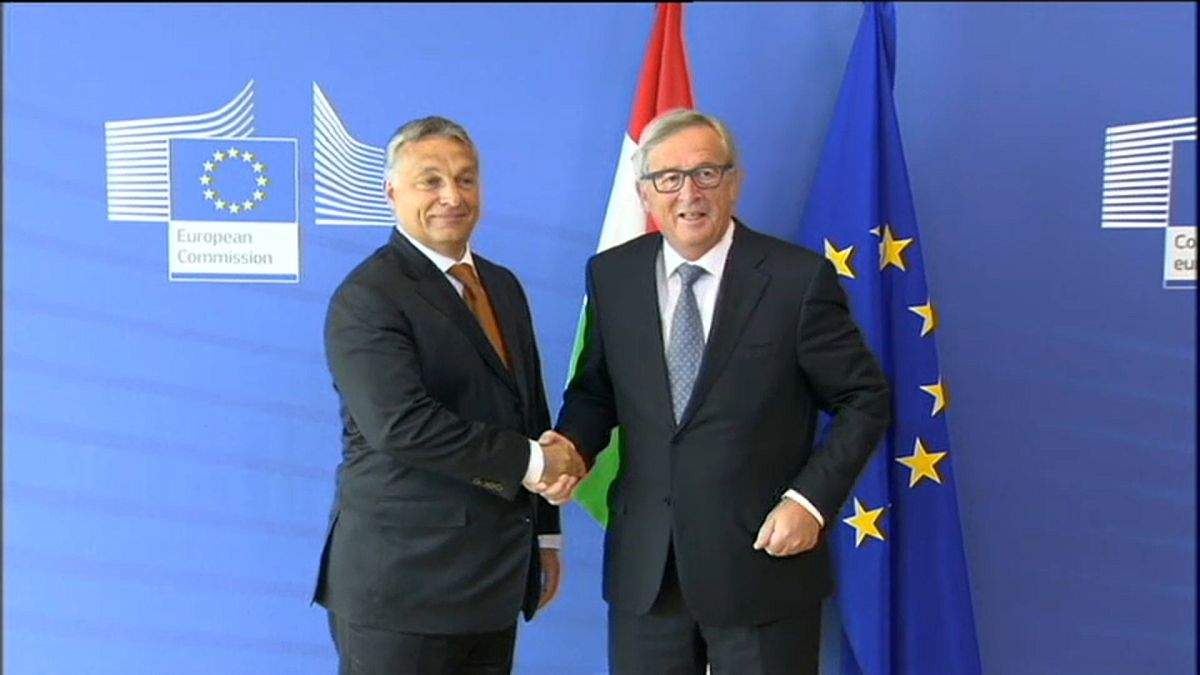Der ehemalige deutsche Finanzminister Hans Eichel kritisiert Ungarn fur demokratische Defizite. Wichtige Grundprinzipien würden mehr und mehr eingeschränkt, deshalb sollen EU-Gelder eingefroren werden.
Die EU liegt seit Jahren mit Ungarn im Streit, aus Sicht Brüssels werden wichtige demokratische Grundprinzipien mehr und mehr eingeschränkt. Gegen Ungarn läuft deswegen ein Vertragsverletzungsverfahren.
Da Ungarn seine Politik bisher unbeeindruckt fortsetzt, fordern jetzt vier ehemalige Europa- und Finanzpolitiker, EU-Zahlungen an Ungarn einzufrieren. Mehr als 95 Proznet der öffentlich geförderten Projekte im Land werden aus EU-Mitteln finanziert.
Die vier "elder Statesmen" sind Hans Eichel, ehemaliger deutscher Finanzminister, Pascal Lamy, ehemaliger EU Kommissar wie auch der Österreicher Franz Fischler und der Grieche Yannis Paleokrassas. Die vier kritisieren in ihrem offenen Brief unter anderem, das Ungarn sein Rechtssystem undemokratisch verändere, Pressefreiheit, Forschung und Lehre beschränke oder EU Gelder zweckentfremde, indem es vor allem für parteipolitische Zwecke der regierenden Partei Fidesz missbraucht werde und so der Korruption Tür und Tor geöffnet werde. Die EU müsse ihrer Verantwortung gerecht werden und handeln, indem sie Mittel einfriere und so den Druck auf Ungarn erhöhe.
Es sind vor allem die Nettozahler in den EU-Haushalt die ein solches Vorgehen schon länger disktieren. Sie wollen die Rechtsstaatlichkeit zur Bedingung für Zahlungen aus der EU-Kohäsionspolitik zu machen. Frankreich, die Niederlande, Finnland, Schweden, Dänemark und Belgien fordern Restriktionen, Ungarn und Polen weisen dies zurück.
Ungarn sucht derweil verstärkt nach neuen Partnerschaften und Investoren. Auf dem jüngsten Gipfel der Ost- und mitteleuropäischen Staaten erklärte Viktor Orban China zum strategischen Partner, der anders als die EU die Mittel besäße, die notwendigen Zukunftsinvestitionen in Ungarn zu sichern. Auf dem Gipfel wurden chinesische Investitionen in Höhe von 3 Milliarden Dollar in Ungarn besiegelt, China kündigte weitere, hohe Investitionen im gesamten CEEC-Raum an.
Der offene Brief im englischen Wortlaut:
Dear Mr. President Jean-Claude Juncker,
As signatories to this letter, we ask the European Commission to temporarily suspend payment of all EU funding to Hungary, with the exception of funding provided directly by the Commission (i.e. without the intermediary role of the Hungarian government).
Over recent years, the whole institutional and legal system in Hungary has been transformed in a way that makes it much easier to assign a substantial part of EU money directly or indirectly to certain business and political groups, no matter how detrimental this is for the Hungarian society, and thus also for attaining the objectives of the European Union.
Key public institutions, such as the office of the prosecutor general and the constitutional court, have been de facto taken over by the ruling party, Fidesz.
The Constitution has been amended several times to serve the interests of Fidesz.
Press freedom has been eviscerated, and the overwhelming majority of the media is now Fidesz dominated.
Access to information has been seriously curtailed by several new laws.
Universities have practically lost their independence as they have been put under the strict control of “chancellors” appointed by the government.
Harassment and smothering of civil society organisations has been going on for years. It is also telling that the Hungarian government has refused to join the EU’s key anti-corruption initiative, the European Public Prosecutor’s Office.
We fully agree with the following statement in the Commission’s Reflection Paper on the Future of EU Finances:
“Respect for the rule of law is important for European citizens, but also for business initiative, innovation and investment, which will flourish most where the legal and institutional framework adheres fully to the common values of the Union. There is hence a clear relationship between the rule of law and an efficient implementation of the private and public investments supported by the EU budget.”
More than 95% of public investment projects in Hungary receive EU co-financing. The Hungarian government announced that it will use 2017 and 2018 to allocate most of the EU money available for the funding period 2014-2020, and is rapidly implementing this strategy. The purpose here is clear: to help Fidesz at the national elections in spring 2018, without any consideration of what will happen after 2018 when EU funding will be mostly exhausted. Such jerking of the economy is also extremely detrimental for business in general, the rapid disbursement leads to inefficient use of EU money, and greatly increases the risks of corruption. This brings a special urgency to the situation.
It is time to heed the Dutch ambassador to Hungary, Gajus Scheltema:
“The argument over what happens with our money is indeed growing ever fiercer. We can’t finance corruption, and we can’t keep a corrupt regime alive. At the same time, we need to continue supporting underdeveloped areas – that’s solidarity. Economically Hungary still lags behind Western Europe, so we need to help. But in such a way that both the Hungarians and the Dutch are satisfied. We need to make the system much more transparent, accountable, and monitored.”
To emphasise the point: a temporary cessation is what this situation requires; all funding can and should be restored as soon as basic democratic freedoms are reinstated and corruption counteracted. We strongly believe that this is also a pre-condition for continuing EU funding to less developed regions – which is indispensable for the future of the European Union – in the period following 2020 in light of growing resentment all over Europe about the inefficient and improper use of EU funds.
It is the Commission’s duty to protect the EU’s financial interests. The Commission should live up to its duty concerning Hungary without any further delay.
We are looking forward to your reply as soon as possible.
Yours sincerely,
Hans Eichel, Co-founder and former Chairman of G20, former Minister of Finance of Germany
Pascal Lamy, former European Commissioner, President Emeritus of the Jacques Delors Institute
also on behalf of
Franz Fischler, former European Commissioner
Yannis Paleokrassas, former European Commissioner
